#neurobiologist
Text

Nobel Prize-winning neurobiologist Rita Levi-Montalcini was born in 1909 to a Jewish-Italian family in Turin. Levi-Montalcini's years in medical school coincided with the rise of fascism in Italy and the imposition of anti-Semitic laws which limited her career prospects. Once WWII broke out, she and her family decided to stay in Italy rather than flee overseas and she built a laboratory in her bedroom to continue her research work. It was in this makeshift laboratory that she began studying the development of chicken embryos; research that laid the underpinning of her later Nobel Prize-winning work on the mechanism of cell growth regulation.
After the Nazi invasion of Italy in 1943, Levi-Montalcini and her family were forced underground and moved to Florence where she worked as a doctor in Allied war camps after the city was liberated. Following the war, in 1946, she moved to the U.S. for more than twenty years to conduct research at Washington University in St. Louis. It was there that she discovered nerve growth factor, a protein which regulates the growth of cells; this discovery was critical to better understanding tumor growth among other conditions.
It was for this breakthrough research that the Nobel committee described her work, along with fellow winner Stanley Cohen, as “a fascinating example of how a skilled observer can create a concept out of apparent chaos.” Both received the 1986 Nobel Prize for Medicine. Dr. Levi-Montalcini passed away in 2012 at the age of 103.
29 notes
·
View notes
Text
#neuroscience#science#neuroscientist#neurobiologist#scientist#podcast#health and fitness#lab podcast#science podcast#health#dopamine#motivation#motivational speaker
0 notes
Text
قد يكون المحتوى مستقبلًا روبوتَ دردشة يُجيبك مستمدًا من محتوى المصدر الأحبِّ لقلبك
قد يكون المحتوى مستقبلًا روبوتَ دردشة يُجيبك مستمدًا من محتوى المصدر الأحبِّ لقلبك
مساء الروبوتات،
تخيّل بَدَل أن تسأل برنامج دردشة روبوتي متطور مثل ChatGPT أن تسأل روبوت دردشة يستمد إجاباته من محتوى صانع المحتوى المفضّل لديك.
لنشرح أكثر:
بدل أن تسأل شات جي بي تي (ChatGPT) سؤالًا عن كيف تُرسخ عادة حميدة في حياتك فيجيبك من كيسه (الملئ بالثقوب)
تسأل روبوت دردشة مرّ على كل حلقات اخْتصاصيّ البَيُولوجيا العصبيَّة (neurobiologist) أندرو هابرمان (Andrew Huberman) ويجيبك انطلاقًا…

View On WordPress
#Andrew Huberman#ChatGPT#Every Media#Huberman Lab podcast#neurobiologist#Ruby on Rails#بودكاست مختبر هابرمان#بودكاست هابرمان لاب
0 notes
Text
...
#aye. in another life i would have loved to be an illustrator#i dont like to do digital tho and i dont wanna b a starving artist and i like science too much#but it would make me so hsppy if i was allowed to draw all day everyday#forever and ever drawing#but nooo i wanted to get a phd in microbial evolution. and im procrastinating working on my preproposal#literally doing anything to not work on it. i coulf have been a illustrator. an endocrinologist. a neurobiologist. a paleontologist. but i#chose microbial ecologist then thought no fuck ecology and went for photosynthetic mechanisms#bc i do love my lil cyanos and i do love Microbiology. i love those underapprecated lil guys#the world is so big and beautiful and all i wanna do is understand. but my stupid brain doesnt work right and ive burried my wonder for so#long i wonder if ill ever have it back. i was reading a bunch of lil notes i wrote this semester and i go from#everything is so beautiful i cant stand it. there are angels in the sunbeams and they feel like healing. to im the world around me is#warping beyond my control. i cant feel any joy. my head is sending me terrible ideas but im not even scared. it feels inevitable#but last week i was so full of energy i couldnt sleep. nothing changed but the chemicals in my head#hopefully next semester will b better and i can stop feeling like damaged goods and feel bad fro my advisor#for having to deal with me. hes v nice and has a bip0lar brother so he's sympathetic but i wish he didn't have to b#i want to stop fantasizing about being something else and just focus on being better at what i am#but im such a pathological perfectionist that its so difficult to make any progress. but whatever ive been feeling alright for the#past week or so. hopefully that carries through. and maybe somedsy i can illustrate something for my precious baby cyanobacteria#unrelated
16 notes
·
View notes
Text
at any given time I am thinking about Your Brain Is Not an Onion With a Tiny Reptile Inside (2020) by Cesario, J., Johnson, D. J., & Eisthen, H. L.
#when the methodology is flawed and the neurobiologists get mean#i hate evolutionary psych so any time there's a metaanalysis that goes yeeeeeeah this premise does NOT hold up#i go YES!!!!! YES!!!! BESTIES KILL!!!!!#also it's a fun article title
18 notes
·
View notes
Text
Day 1774
beheohp
8 notes
·
View notes
Text
Sheldon: "Your meme hypothesis does intrigue me. How do we examine this more closely?"
Amy: "Do you have any ethical qualms regarding human experimentation?"
Sheldon: "It's one of the few forms of interaction with people that I don't find repellant."
Amy: "We need to fabricate a tantalizing piece of gossip."
Sheldon: "And a second non-tantalizing to piece to use as a control!"
Amy: "Then we will track its progress through our social group and interpret the results through the competing academic prisms of memetic theory, algebraic gossip, and epidemiology!"
Sheldon: "Look at you! Getting me to engage in the social sciences! You're a vixen Amy Farrah Fowler!"
The Big Bang Theory 4x20 The Herb Garden Germination
#uuuuuugh#I love early shamy so much#also conspiring to experiment on their friends shamy too#which is always a classic#Sheldon's neurobiologist vixen queen#sheldon cooper#shamy#amy farrah fowler#my favorite shamy quotes#just shamy things#the big bang theory
5 notes
·
View notes
Text
mycelium and AI are lovers
#they just are like somehow they connect but idk how#me n *** were considering growing a batch to connect to connect to a computer and then building an interpreter AI to translate signals#not translating signals from a mycelial network (impossible as of ...rn) but from like . smth else .#like using the network as a way to transfer data . he was thinking of finding a way to connect them to human nerves#hes a neurobiologist so . idk he said some stuff that i understood maybe 40% of . but he also said#it would be outrageously expensive even if it were possible :(#bro i was looking into buying a culture and theyre like 100 quid which now i do not have the money for but back then i did BUT#its like . from the uk health security website thing and u need this special bank acct to be able to buy them in the first place#ugh whatever#theyre just connected somehow#mycelial networks and artificial neural networks share smth transferrable in common#@mycologists help me out bro#also what constitutes a mycelial network ? at what point are they an actual network of mycelium ?
10 notes
·
View notes
Text
today in “trying to ignore the news” my building had a party for all the bio labs and my lab took a walk around the pond by our building and jokingly asked me to grab a bullfrog out of the water and were shocked when i did a moment later
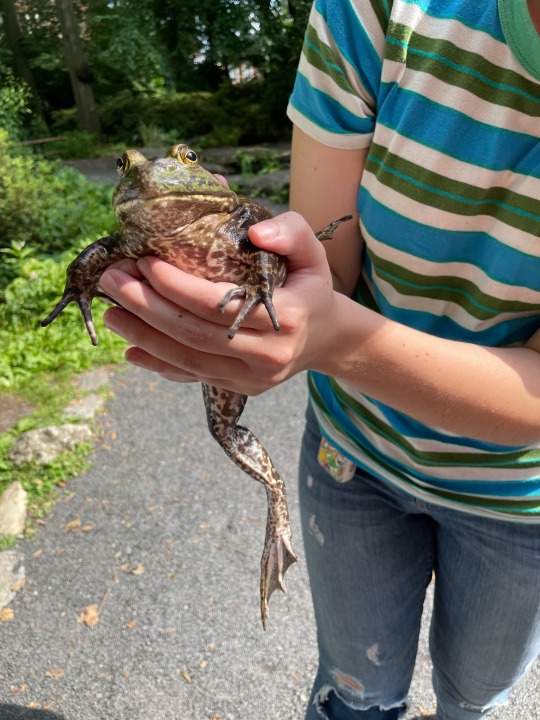

#regan.txt#me#HE’S JUST A GUY!!!!!!#i think my lab forgets i’m the only person there who isn’t a neurobiologist#like yes i will grab a frog out of water without hesitation. that’s literally what i do
5 notes
·
View notes
Text
chingao, where the fuck am i supposed to find another neurobiologist now?
#neurobiologist wanted#please hmu if you're one :c please be my friend so that i can ask you many questions really often#in exchange i'll be a good friend and I'll send you the freshest memes around and morning texts and an occasional kiss on the forehead#i love you in advance#my ex-living-source-of-sources in biology is.... really troubled to the point of deliberate aggression and acts like it's nothing#so i had to block him#so please please please apply 🫂 I'll love and take care of you#forever and ever#i know a few cents of mathematics and even half a grain of sand of physics if you find that useful#but i have oceans of love and care and cursed images 🫂#neurobiology#neuro#biology#neurochemistry#PLEASE omg
0 notes
Text
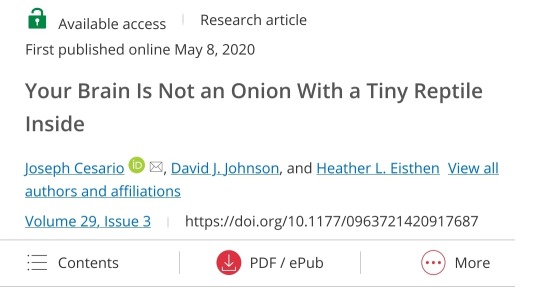
A widespread misconception in much of psychology is that (a) as vertebrate animals evolved, “newer” brain structures were added over existing “older” brain structures, and (b) these newer, more complex structures endowed animals with newer and more complex psychological functions, behavioral flexibility, and language. This belief, although widely shared in introductory psychology textbooks, has long been discredited among neurobiologists and stands in contrast to the clear and unanimous agreement on these issues among those studying nervous-system evolution. We bring psychologists up to date on this issue by describing the more accurate model of neural evolution, and we provide examples of how this inaccurate view may have impeded progress in psychology. We urge psychologists to abandon this mistaken view of human brains.
3K notes
·
View notes
Text
there's been a lot of stories about transmascs dying in horrible ways recently. so i wanna share a quote from Ben Barres, a trans neurobiologist who transitioned in 1997. he wrote this before his death in 2017 at age 63:
I have lived life on my terms: I wanted to switch between genders, and I did. I wanted to study glia, and I did that too. I stood up for what I believed in and I like to think I made an impact, or at least opened the door for the impact to occur. I have zero regrets and I'm ready to die. I've truly had a great life.
Every transmasc, trans boy, and trans man deserves to live a long life on their own terms.
4K notes
·
View notes
Text
#neuroscience#science#neuroscientist#neurobiologist#scientist#podcast#health and fitness#lab podcast#science podcast#health#dopamine#motivation#motivational speaker
0 notes
Text
Top Ukrainian female Scientists, Doctors, Mathematicans, Economists, Artists, Athletes, Leaders, Astronauts, Military Leaders, etc.
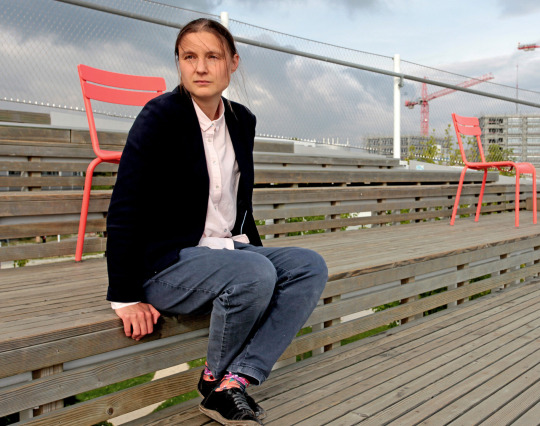
The Ukrainian mathematician Maryna Viazovska who won Fields Medal — the highest honor for a mathematician.
Selected few famous Ukrainian scientists
We decided to talk about outstanding Ukrainian women who've changed and continue to change the world of science to show that girls can do anything.
Maryna Viazovska, a mathematician
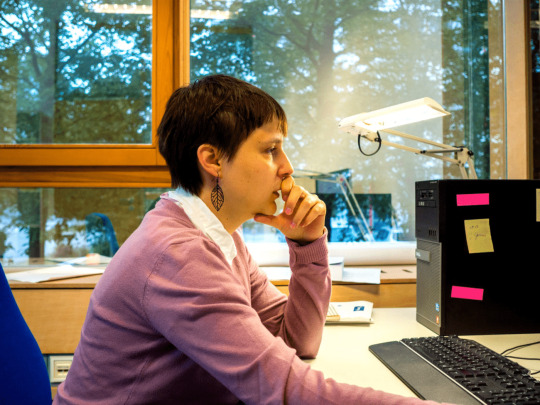
Ukrainian scientist, doctor of natural sciences. Ukrainian mathematician Maryna Viazovska, who currently works at the Swiss Federal Institute of Technology, received the Salem Prize 2016, which is extremely prestigious for mathematicians. The commission awarded the prize to Maryna Viazovska for her world-class discovery. Ukrainian solved a problem that scientists have been working on for more than 400 years, i.e. packing spheres in 8-dimensional space, and co-authored the one in 24-dimensional space. Previously, the problem of packing spheres was solved only for spaces with three or fewer dimensions.
Yuliia Bezvershenko, a physicist

Ukrainian scientist in theoretical physics, popularizer of science, public figure, Ph.D. of physic and mathematical sciences, Yuliia Bezvershenko is included in the list of TOP-20 Ukrainian women in STEM for 2018-2019. Yuliia deals with mathematical methods applied to the problems of dynamics of quantum systems in external fields and control of quantum systems. She is convinced and proves that one can practice theoretical physics with passion.
According to Yuliia, at one time she heard an important thing from her mentor: you can be yourself in any field! Therefore, one shouldn't be afraid of stereotypes and prejudices of others.
If you're a girl, a woman, no matter where, no matter how old you are, and your heart is in science, don't be afraid. Go there boldly. After all, nothing will stop a woman, ready to work and conduct scientific discoveries.
Mariia Bailiak, a biologist
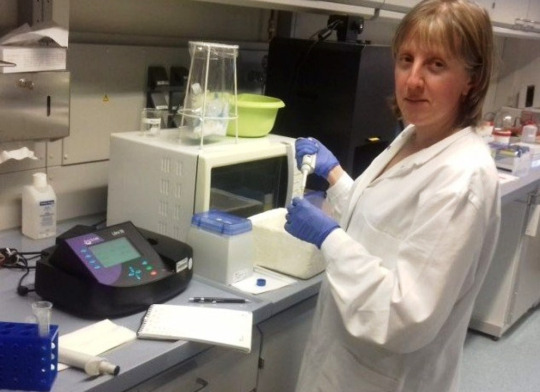
Doctor of Biological Sciences, Associate Professor of Biochemistry and Biotechnology in Vasyl Stefanyk Precarpathian National University. Scientist Mariia Bailiak studies biochemistry and researches the influence of various plants and substances on the aging process. Mariia Bailiak's discoveries concern, for instance, the increase of stress resistance and the general condition of living organisms (and therefore, us and you, and it's good news: stress resistance doesn't hurt anyone), and anti-aging substances. Thanks to her intensive work, Mariia is in the Top 10 successful Ukrainian women scientists.
Olha Brovarets, a biophysicist
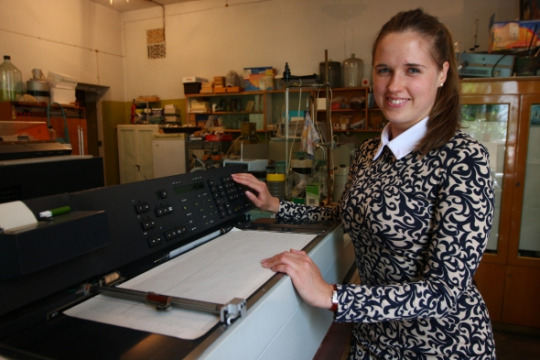
Ukrainian biophysicist, Doctor of Physic and Mathematical Sciences, winner of the Scopus Awards Ukraine in the nomination "Best team of scientists who achieved significant scientific results without Western collaborations" and the President of Ukraine Award for Young Scientists, and a leading researcher in the Department of Molecular and Quantum Biophysics Institute of Molecular Biology and Genetics of the National Academy of Sciences of Ukraine. Olha is the youngest doctor habilitatus in Ukraine; she became a doctor at 29. Olha is now 34 years old and she continues to study biophysics: her discoveries give an understanding of the mechanisms of cancer and many other diseases caused by mutations. It was Olha who calculated the pattern of mutations in DNA leading to cancer and many other diseases.
Nana Voitenko, a biologist
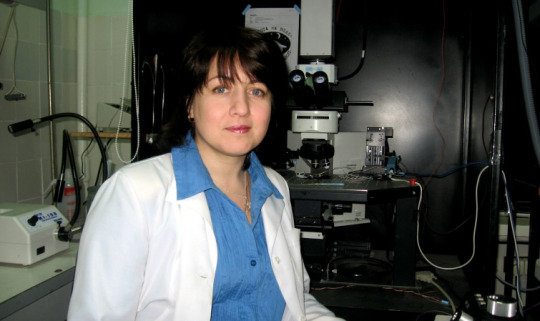
Professor, Doctor of Biological Sciences, neurobiologist, head of the department of sensory signaling of the Bohomolets Institute of Physiology of NAS of Ukraine. Nana Voitenko has been researching pain for more than 20 years. What do we know about pain? For most people on Earth, pain is something they'd like to get rid of as soon as possible if they feel it. Nana Voitenko deals with the nature of pain, as it occurs and spreads in the human's central and peripheral nervous systems. In the laboratory, Voitenko and her colleagues managed to develop an experimental treatment that affects only those cells involved in pain syndromes. Besides, Nana Voitenko is actively promoting science: she's a lecturer at the "Days of Science" initiative, was a lecturer at TED-x Kyiv in 2013, and the organizer of the "Week of Knowledge about the Brain." Science is close, and it's accessible to everyone.
Ella Libanova, an economist

Scientist in socioeconomics, demography, and labor economics, academician of the National Academy of Sciences of Ukraine, Doctor of Economics, Professor, Honored Economist of Ukraine. Ella Libanova is an academician-secretary of the economics department of the National Academy of Sciences of Ukraine and, by the way, the first and only female member of the presidium of the National Academy of Sciences for 102 years of its work. She teaches social statistics at the Faculty of Economics of the Taras Shevchenko National University of Kyiv; introduced a method for measuring human development at the region level, used by the State Statistics Service of Ukraine for annual calculations.
Nina Virchenko, a mathematician
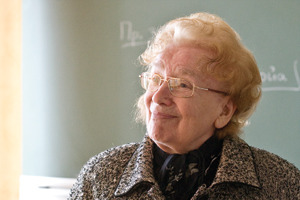
Professor of the Department of Mathematical Analysis and Probability Theory, Doctor of Physic and Mathematical Sciences Nina Virchenko is one of the most famous Ukrainian mathematicians. She is the author of more than 500 scientific and methodological works, including 20 books published in Ukrainian, Russian, English, and Japanese. Nina Virchenko is recognized not only in Ukraine but also abroad; she's a member of the Australian, American, Belgian, Edinburgh, London mathematical societies. In the end, it's not surprising, because mathematics knows no boundaries and recognizes all the achievements, wherever you obtain them.
Nina Virchenko's fate wasn't easy: at 18 in 1948, she was sentenced to 10 years in the Gulag camps for preparing a "political conspiracy, revolt" and participating in the "Ukrainian-nationalist gang." Years in the camps didn't stop the future doctor from achieving her dreams. In 1964, she defended her Ph.D. and her Dr. habil. dissertation in Kyiv in 1988.
Nataliia Vynohrad, an epidemiologist
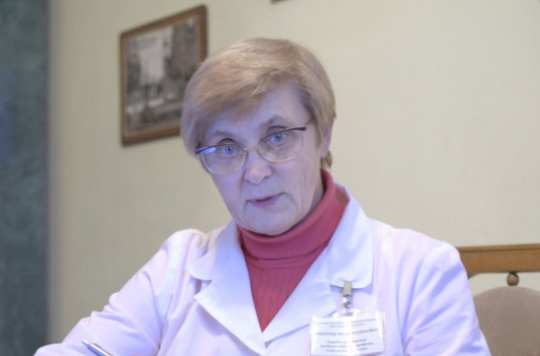
Epidemiologist, professor, doctor of medical sciences, Nataliia Vynohrad manages the Department of Epidemiology of Lviv National Medical University. She's an expert of the World Health Organization in responding to epidemic threats and the Ministry of Health of Ukraine on epidemiology, an adviser to the Ministry of Emergencies of Ukraine on anti-epidemic protection and biosafety. Agree, you can't find a more relevant profession in 2020-2021. Once an ordinary girl from a village in the Khmelnytskyi region, and now the author of 305 scientific papers, and 8 copyright certificates for inventions and patents of Ukraine, proves that nothing is impossible for a girl who knows what she wants.
Nataliia Polonska-Vasylenko, a historian
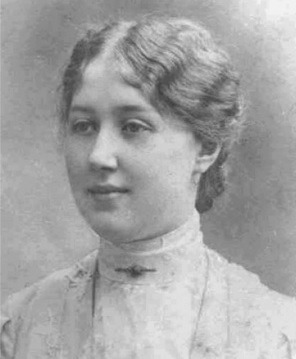
From the early 20th century until the end of her life in the 1970s, our first heroine studied the history and archeology of Ukraine, both in Ukraine and later in exile in Germany and the Czech Republic. In a historically troublesome time for Ukraine, she became one of the leading representatives of the state school in Ukrainian historiography, that is, she promoted the idea of independence and continuity of the Ukrainian historical process. Nataliia Polonska-Vasylenko is the author of almost 200 scientific works on the history of Zaporizhzhia and Southern Ukraine, which remain relevant to this day.
Valentyna Radzymovska, a biologist

One of the most prominent names in our history is Valentyna Radzymovska, a professor, doctor of medical and physiological sciences, founder of the Ukrainian school of physiologists and biochemists, and a public figure. The Soviet authorities repressed Valentyna Radzymovska for her political activities and participation in the Union for the Liberation of Ukraine in the 1930s. However, it didn't prevent her from becoming the author of more than 60 works on biochemistry, pathophysiology, pediatrics, psychoneurology, physiology, and phthisiology. Like the previous scientist in our article, she left Ukraine in 1945, emigrating first to Germany and then to the United States.
Radzymovska contributed hugely to the study of tuberculosis and its treatment in children.
Nina Morozhenko, a physicist

Although the sun is the closest star to us, it still hides many fascinating mysteries. Ukrainian astronomer, helio physicist, doctor of physic and mathematical sciences, author of 56 scientific works, Nina Morozhenko devoted her entire life to studying the structure of our guide light and the processes taking place on it. After all, everything happening on the Sun affects many areas of human activity. Without studying the sun, it's impossible to understand not only what the future holds for our civilization but also what is happening in space, i.e. on the distant stars the humanity is so eager to reach. Nina Morozhenko's scientific works on solar prominences were the first in the world and gave rise to scientific research by helio physicists from many countries. The Ukrainian researcher's significant contribution to the physics of the sun once again demonstrates that physics isn't a purely "male" science.
192 notes
·
View notes
Text
In what could be excused as a dictionary definition of futility, scientists have tried to teach a species of boxed jellyfish (Tripedalia cystophora) a few simple tricks to test whether learning necessitates a brain.
Don't expect to see 'The Amazing Ball-Juggling Cnidarians and Friends' variety hour on your next trip to Seaworld. This isn't a story about secretly genius jellies.
But the findings do suggest that virtually anything with a handful of neurons and a way to sense their environment can adapt their behavior based on prior experience.
"Learning is the pinnacle performance for nervous systems," says first author Jan Bielecki, a neurobiologist from Kiel University in Germany.
But just what kind of nervous system are we talking about here? Octopuses manage incredibly well without centralized lumps of gray matter, solving problems via a network of around half a billion neurons spread throughout their limbs.
Continue Reading
228 notes
·
View notes
Note
hi i just saw some of ur posts on anti-psychiatry and then kept reading more on ur blog about what it is. for the most part i agree with what you've said about how capitalism uses psychiatry to designate people who are bad/abnormal and how it aligns itself w/ misogyny, racism, and so on. with that said i think i have some similar concerns/questions as another asker about what this means for those who do/would suffer even in a non-capitalist society, even if we didn't ascribe a specific label to X symptoms. if we are opposed to psychiatry, what are the options for people today who are suffering and want help? are you opposed to psychopharmaceuticals and therapy? i dont mean to ask this in a confrontational/accusatory way, i'm just new to this and genuinely curious
There are a few different parts to your question & so there are a few different angles to approach it from—
are you opposed to psychopharmaceuticals and therapy?
If this means "are anti-psych writers and activists opposed to individuals seeking treatment that they personally find helpful," then, no—a couple posts in my psychiatry tag do clarify this.
If it means "are there anti-psych critiques of psychopharmaceuticals and therapy," then, yes. Keep in mind that I'm not a neurobiologist or otherwise an expert on medications marketed as treatments for mental illnesses, but:
The evidence for the effectiveness of SSRIs in particular is sort of non-existent—even many psychiatrists who promote the biomedical model of mental illness doubt their efficacy, and refer to the "chemical imbalance" theory that enforces their usage as "an outmoded way of thinking" or "a kind of urban legend—never a theory seriously propounded by well-informed psychiatrists." But promoting SSRIs (and corresponding "serotonin deficiency" theory of depression, despite the fact that no solid evidence links depression to low serotonin) is very profitable for pharmaceutical companies. Despite the fact that direct-to-consumer advertisements are nominally regulated in the U.S., the FDA doesn't challenge these claims.
Other psychotropic drugs, such as "antipsychotics" or "antianxiety" medication, shouldn't really be called e.g. "antipsychotics" as if they specifically targeted the biological source of psychosis. No biological cause of any specific psychiatric diagnosis has been found (p. 851, section 5.1). In fact, rather than "act[ing] against neurochemical substrates of disorders or symptoms," these medications "produc[e] altered, drug induced states"—but despite the fact that they "produce global alterations in brain functioning," they are marketed as if they had "specific efficacy in reducing psychotic symptoms." Reactions to these medications that don't have to do with psychosis or anxiety (blunted affect, akathisia) are dismissed as "side effects," as though they don't arise from the same global alteration in brain function that produces the "desirable" antianxiety/antipsychotic effect. This doesn't mean "psychiatric medication turns you into a zombie so you shouldn't take it"—it means that these medications should be marketed honestly, as things that alter brain function as a whole, rather than marketed as if they target specific symptoms in a way that they cannot do, in accordance with a biomedical model of mental illness the accuracy of which has never been substantiated.
Psychiatrised people also point out that meds are used as a tool for furthering and maintaining psychiatrists' control: meds that patients are hesitant about or do not want are pushed on them, while patients who desire medication are "drug-seeking" or trying to take on the role of clinician or something and will routinely be denied care. Psychiatrised people who refuse medications are "noncompliant" and prone to psychiatric incarceration, re-incarceration, or continued/lengthened incarceration.
As for therapy: there are critiques of certain therapies (e.g. CBT, DBT) as unhelpful, status-quo-enforcing, forcing compliance, retraumatising &c. There are also critiques of therapy as representing a capitalist outsourcing of emotional closeness and emotional work away from community systems that people largely don't have in place; therapy as existing within a psychiatric system that constrains how therapists, however well-intentioned, are able to behave (e.g. mandatory reporting laws); psychotherapy forced on psychiatrised people as a matter of state control; therapists as being in a dangerous amount of power over psychiatrised people and being hailed as neutral despite the fact that their emotions and politics can and do get in the way of them being helpful. The wealth divide in terms of access to therapy is also commonly talked about; insurance (in the U.S.) or the NHS (in England) may only pay for pre-formulated group workbook types of therapy such as DBT, while more long-form, free-form, relationship-focused talk therapy may only be accessible to those who can pay 100-something an hour for it.
None of these critiques make it unethical or something for someone to get treatment that they find helpful. It's also worth noting that some of these critiques may be coming from "anti-psych" people who criticise the sources of psychiatric power, and some of them may come from people who think of themselves as advocating for reform of some of the most egregious effects of psychiatric power.
if we are opposed to psychiatry, what are the options for people today who are suffering and want help?
This looks like a few different things at a few different levels. At its most narrow and individual, it involves opting out of and resisting calls for psychiatrisation and involuntary institutionalisation of individuals—not calling the cops on people who are acting strange in public, breaking mandatory reporting laws and guidelines where we think them likely to cause harm. It involves sharing information—information about antipsychiatry critiques of psychiatric institutions, advice about how to manage therapists' and psychiatrists' egos, advice about which psychiatrists to avoid—so that people do not blame themselves if they find their encounters with psychiatry unhelpful or traumatising.
At the most broad, it's the same question as the question of how to build dual power and resist the power of capitalism writ large—building communal structures that present meaningful alternatives to psychiatry as an institution. I think there's much to be learned here from prison abolitionists and from popular movements that seek to protect people from deportation. You might also look into R. D. Laing's Kingsley Hall experiment.
what does this mean for those who would suffer even in a non-capitalist society, even if we didn't ascribe a specific label to X symptoms?
It means that people need access to honest, reliable information about what psychotropic medications do, and the right to chuse whether or not to take these medications without the threat of a psychiatrist pulling a lever that immediately restricts or removes their autonomy. It means that people need to be connected to each other in communities with planned, free resources that ensure that everyone, including severely disabled people whom no one particularly likes as individuals, has access to basic resources. It means that people need to be free to make their own choices regarding their minds and their health, even if other people may view those decisions as disastrous. There is simply no defensible way to revoke people's basic autonomy on the basis of "mental illness" (here I'm not talking about e.g. prison abolitionist rehabilitative justice types of things, which must restrict autonomy to be effective).
Also, I've mostly left the idea of who this would actually be untouched, since my central argument ("psychiatry as it currently exists is part of the biomedical arm of capitalism and the state, and the epistemologies it produces and employs and the power it exerts are thus in the service of capitalism and the state") doesn't really rest on delineating who would and wouldn't suffer from whatever mental differences they have regardless of what society they're in. But it's worth mentioning that the category of "people who are going to suffer (to whatever degree) no matter what" may be narrower than some would think—psychosis, for instance, is sometimes experienced very differently by people in societies that don't stigmatise it. I see people objecting to (their interpretations of) antipsych arguments with things along the lines of "well maybe depression and anxiety are caused by capitalism, but I'm schizophrenic so this doesn't apply to me"—as though hallucinations are perforce more physically "real," more "biological," more "extra-cultural" in nature than something like depression. But the point is that positing a specific neurobiological etiology for any psychiatric diagnosis is unsubstantiated, and that capitalist society affects how every "mental illness" is read and experienced (though no one is arguing that e.g. hallucinations wouldn't always exist in some form).
#psychiatry#long post /#mental illness#antipsych#antipsychiatry#Anonymous#questions#psychotropic drugs#ssris
717 notes
·
View notes